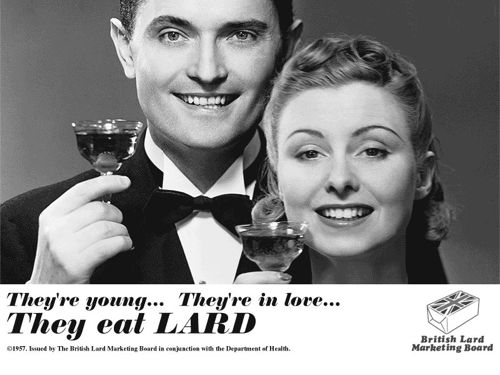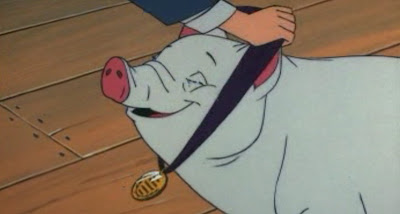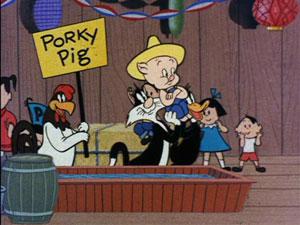Depending on what generation you are from I know its hard to know who to believe when it comes to nutrition. I mean, the 'expert's' opinions seems to keep changing, right? Kind of but not really.....
First, what is lard
Lard is the fat from a pig. For cooking purposes it is rendered and solidifies into a form similar to shortening. Lard typically is rendered from the back area (known as fat back) or the visceral fat from around the kidney/loin area (known as leaf lard). Leaf lard is most likely what your grandmother or great grandmother used to make all her biscuits and pie crusts. Its not hard to find an online forum where cooks are still saying that leaf lard is a superior product to making such (over butter AND shortening). Leaf lard is more neutral in flavor than fat back lard. Fat back lard is used more for frying purposes.
I am curious to know what role lard played in making this couple young and in love.
The Skinny On Fat
As you know, our bodies have to have fat (whether from an animal or a plant source). Our brain, and hormones rely on fat to function. Fat also helps the body to absorb nutrients, calcium, and the fat-soluble vitamins A, D, E, and K. It is said that if you’re drinking non-fat milk enriched with vitamin D, your body will have a difficult time absorbing both the vitamin and the calcium since it lacks saturated fat to help the body do so. This is just the surface of it, please read a smarter person's explanation HERE (in the introduction).
So fat is a must and very important, but here is the thing-
Not All Fats/Oils Are Created Equal
We can all agree that some fats are bad and some are good. Research still continues to work on a 'cut dry' answer on this. Let's back up in history for just a moment to get back to lard-
Animal fats started to get their bad rap in the 1950's when a study was published linking saturated fats with heart disease. It was a faulty study but the vegetable oil industry greatly benefited from it.
 |
| Not an actual ad, its an album cover. |
Lard vs. Crisco and Margarine
One thing research of fats has agreed on across the board is that what replaced these animal fats (such as Crisco and margarine) are much more dangerous to our health. This is because of the trans fat content (all agree trans fat is a bad guy, read more here if interested). I know that in recent years they have developed margarine and shortening with less to no trans fat, but back when it replaced lard this was NOT the case. According to this Harvard Health article, there was NEVER any solid evidence that using margarine over butter lowered your chance of developing heart disease. Back to Lard, it contains little to NO trans fats. Lard that has been heavily processed to give it longer shelf life might have small traces of trans fat, but from my research home rendered or lightly processed lard most likely will have even smaller traces (and even smaller traces if pasture raised). Shortening (Crisco) which is now made, so called, 'trans fat free' most certainly still has trans fat. If any product lists a partially hydrogenated oil in its ingredients (which Crisco does along with most margarines I believe) then it DOES contain trans fat. It is able to claim trans fat free because the FDA allows products containing less than 0.5g in a serving size as trans fat free. (says so here). The serving size for Crisco is 1 Tablespoon. I don't know about you but none of my recipes requiring shortening call for as little as 1 Tablespoon. My grandma's biscuits recipe for instance uses up to 1/2 cup shortening, those trans fat grams add up.
Soooo, in regards to trans fat, lard easily wins the healthier prize-
Lard - 1, Shortening and most margarines - 0
Lard vs. Butter
Let me start out by saying that I would rather spread delicious butter on my toast than lard (though some countries do use lard as a spread). Put similar applications aside.... the argument here is centered around saturated fat. Saturated fat from animal and plant sources provide a concentrated source of energy, provide building blocks for cell membranes and are needed for hormone production (just to name a few pros). From my understanding though, this particular fat is the center of the most controversy: some believing it is a bad fat connected to heart disease, others believe it should be consumed regularly and quite essential to your health. I will share that I believe if you are overall a healthy person I agree with the saturated fat advocates. A few good sources supporting this found here and here (see Saturated Fat section). I encourage you to research and decide for yourself.
As you know, all things have to be consumed in moderation, even good fats. The major health sites recommend limiting dietary fat to no more than 20-35% of your daily calorie intake (per mayoclinic's article here). So here is my quick undercut to butter (sorry dear, delicious friend). Per tablespoon lard has 16% less saturated fat than butter (7g vs 5g). Ramp that serving size up to 1 cups worth (needed for most pie crust recipes), lard has 37 less grams of saturated fat than butter. Here's another quick punch- lard has double the monounsaturated fat (a very good fat for your health, agreed across the board) than butter. Lard having 6g per tablespoon vs. butter's 3g (Crisco has 2.5g/tablespoon).
So in regards to healthy fat ratio and content-
Lard - 1, Butter - 0
Lard vs Olive Oil
Oh yes I did, I am totally going here. It is well established that olive oil is a superior oil to consume for your health. It is very high in that good fat we just talked about (monounsaturated fat) with 10g in 1 tablespoon. It is also trans fat free in its natural state and low in saturated fat. One concern some have with extra virgin olive oil is that when it is heated to its smoking point, it becomes unstable and changes in composition. Some of it's health benefits are lost and it also forms trans fat when over heated. Makes sense since this why over processed vegetable oil products have trans fat (such as shortening and margarine, ie trans fat is mostly man made from over processing). Lard can only kick olive oil in the shin at this fight as its smoking point it not too much higher than regular olive oil. (And I read that unless you are heavily deep frying in olive oil you are most likely NOT reaching its smoking point). Lard IS more stable and has a longer shelf life than olive oil, therefore holding its nutritional value longer. But one area that lard is way more nutritious than olive oil is the Vitamin D department. Olive Oil has ZERO grams of vitamin D vs. pastured lard having up to 1000 IU of vitamin D per tablespoon. This source is second to only cod liver oil... and again remember it has to be from pastured pigs (where pigs are foraging and getting their sunlight). According to the US Institute for Medicine, it is recommended for children and adults to receive 600 IU per day. Vitamin D is super important to our health so I will still consider this victory over olive like a small slap in the face (sorry this post is so violent).
So in regards to the important vitamin D-
Lard - 1, Olive Oil- 0
"That'll do pig, that'll do".
Finally in conclusion, maybe you should look into the fats you are consuming. Don't make your judgements until you do so. And don't judge something until you do (like pork lard). Also remember that store lard is NOT the same product usually, most likely containing the partially-hydrogenated fats as discussed before from the processing.
If you are one of those people who research which oil is best to put in your car for better performance (I did this back in my day of cool car ownership) or which conditioner makes you hair the most healthy (I did this too back when I had time to wash my hair).... THEN WHY IN THE WORLD NOT CARE WHAT FATS (or all foods in general) YOU PUT INSIDE YOUR BODY. I think you will benefit much more with a healthy feeling body. Sorry for the yelling, the kids were quite uncooperative this morning (yes, thats my excuse).
To end here are some pictures of my home rendered lard (from our pigs) and some products made from it-
Cut up leaf lard and rendered slowly in the crock pot-
Finished, cooled product-
Happy customer, most definitely makes biscuits fluffier than shortening (I recommend leaf lard and its mild flavor for this and pie crusts)-
I cannot take credit for this berry pie, our friend Topper made it. I asked him to make one while visiting once since he makes one of the BEST pie crusts I have ever had!









No comments:
Post a Comment